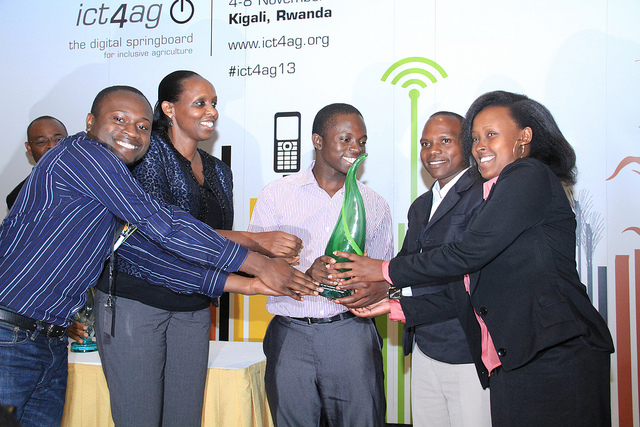When I first met Gerald Otim and Opio David at CTA’s first agricultural hackathon in 2013, they had their heads locked together, preparing the pitch for the app they had been working on to improve access to finance for smallholder farmers in Uganda.
Now, they work full-time for their start-up company that not only won them the title as Eastern Africa’s AgriHack Champions, but also a place on a follow-up business incubation programme and access to financial partnerships with online crowdfunding organisations such as Kiva.
Their winning solution, Ensibuuko, is a mobile and web application that brings together SMS and mobile money services to enable Savings and Credit Cooperatives (SACCOs) to handle savings and loans to smallholder farmers and aims to reach over 25,000 smallholder farmers by 2015.
The system allows farmers to register using SMS, and save, receive and pay back loans using mobile money. The app also has an information management system, so that SACCOs can track the savings and credit history of their members. The result is easier financial credit and savings management for producers, lower costs and greater transparency for SACCOs.

For me, the story of these two young men epitomises the opportunities that ICTs can offer for young people in agriculture and rural development across the developing world.
We are all too familiar with the challenges that face agriculture. The average age of a farmer in the developing world is 55-60 years. Young people are less attracted to agriculture, which they perceive as backward and unrewarding, often looking to other sectors for their careers. However, ICTs are proving to be a good avenue when it comes to enticing the youth into agriculture, not only to work as young farmers, but also to help modernise the sector with the use of new technologies.
That is why we began the AgriHack Talent programme, to promote youth employment, capacity building in ICT for agriculture entrepreneurship and advance the agricultural sector through innovation. Unlike many other hackathons, AgriHack Talent does not stop when the competition winners are announced. The programme supports the best apps further to enable their roll-out. It engages the partner organisations such as the ICT innovation center Outbox in the case of Ensibuuko, throughout the incubation providing office space, business advisory and network access. Key agricultural organisations are involved in each edition such as Caribbean Agriculture Research and Development Institute, Alliance for a Green Revolution in Africa and the Rwandan Ministry of Agriculture.
Other winners of the East African competition include an app which will provide agriculture information via mobile phone to farmers in Ethiopia and another which helps to map and manage agricultural lands in Tanzania.
AgriHack Talent competition are now reaching as far as the Caribbean, with the finals and prize giving ceremony were held in Suriname during the Caribbean Week of Agriculture in October. The winners, from Jamaica, showcased hardware that offers real-time weather analysis and automatic yield forecasts for farmers. Other winning solutions included an information platform for Surinamese farmers and an app to help improve pest management in Barbados. The business incubation support for the winners in the Caribbean will start in the coming few weeks. The programme has supported more than 250 young people so far in the two regions.
I am convinced that ICTs are critical in transforming agriculture in Africa, Caribbean and Pacific countries. CTA has been supporting several projects and activities over many years to help educate and inform young people as well as other groups about what ICTs can offer. Examples of these include the ARDYIS project, which aims to raise youth awareness and capacity on agricultural and rural development issues in ACP countries through ICTs, and the award-winning Web2.0 and Social Media learning opportunities, a series of workshops which to date have trained approximately 3,000 people in 35 ACP countries, 38% of whom were women.
But many questions remain on the best way to accelerate ICT development for agriculture. How can we engage agricultural stakeholders in the app development process? How we can we scale up ICT4Ag initiatives and make them sustainable?
Our 2013 ICT4Ag international conference highlighted two principle challenges. First, it became clear that a highly diverse range of ICT applications were being developed with little communication amongst the innovators in the development process, resulting in huge overlapsin the services offered in some areas and leaving gaps in others. Secondly, the majority of solutions spend a long time at the pilot stage(even with years of donor support), with few able to scale up and eventually become sustainable without support from donors.
Therefore, one action we must take is to ensure that the young entrepreneurs developing these ICT solutions have significant and meaningful interaction with each other and the products’ end-users (farmers themselves), as well as the information intermediaries (those providing agricultural extension and advisory services to farmers). This should go a long way to ensuring the adoption, uptake and scaling-up of these solutions.
To help address these questions and more, CTA is hosting an expert consultation ‘Facilitating the convergence of ICT channels for agriculture’, between 29-31 October 2014 in the Netherlands. I would like to invite everyone to join and contribute to the discussion by following #ITconverge4Ag.
With both the ICT and agriculture landscapes changing so rapidly, the opportunities for the youth, that we could never have imagined just a few years ago, can become a reality now.



